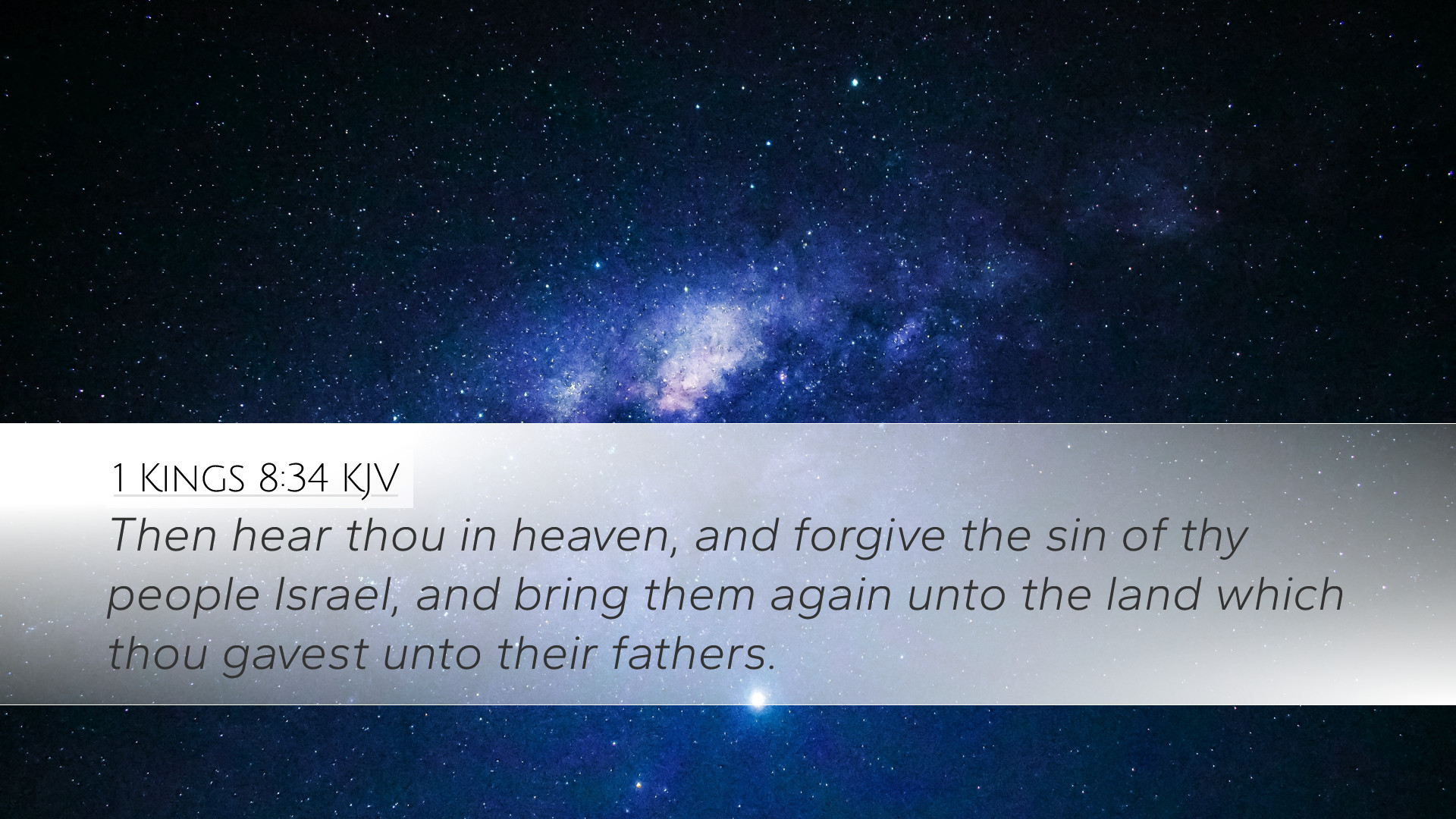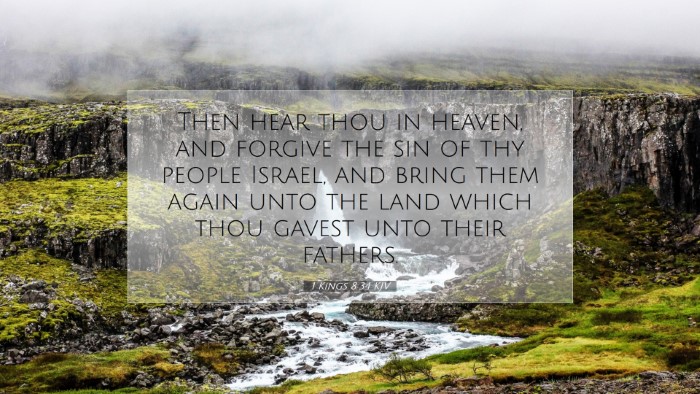Commentary on 1 Kings 8:34
Verse Context: The verse states, "then hear thou in heaven, and forgive the sin of thy people Israel, and bring them again unto the land which thou gavest unto their fathers." This prayer was offered by Solomon during the dedication of the Temple he built in Jerusalem. It reflects the heart of intercession on behalf of Israel.
Insights from Matthew Henry:
Matthew Henry emphasizes the importance of prayer, specifically that it demonstrates the necessity of seeking God for forgiveness and deliverance. In this prayer, Solomon recognizes that sin is the common issue among the people and that divine intervention is crucial for restoration.
- Nature of Forgiveness: Henry highlights that forgiveness is a foundational aspect of God’s character, illustrating His readiness to pardon those who sincerely repent.
- Significance of the Land: The mention of bringing the people back to their land speaks to God's promises and the covenant He made with the ancestors of Israel. It signifies hope and a future rooted in divine faithfulness.
- Intercessory Prayer: This prayer serves as a model for intercession, as Solomon, representing the people, acknowledges their faults and appeals for God’s mercy.
Insights from Albert Barnes:
Albert Barnes provides a detailed analysis pointing out the theological implications of this passage. He observes that this part of Solomon’s prayer reveals a profound understanding of the human condition and God’s response to sin.
- Divine Response: Barnes notes, “God will hear from heaven.” This reflects not only the omnipotence of God but also His interest in and care for His people. The anticipation of God’s forgiveness is vital to the mental and spiritual state of Israel.
- Repentance: Barnes stresses the condition of repentance inherent in the prayer. The restoration of Israel hinges upon their acknowledgment of guilt and a sincere turning back to God.
- Theological Implications: The request for forgiveness highlights the reality of sin in the life of believers, emphasizing the constant need for reconciliation with God.
Insights from Adam Clarke:
Adam Clarke delves into the broader implications of the prayer, discussing not only its immediate context but its ongoing relevance for the Church and individuals today. He notes the importance of the Temple as a place of divine encounter.
- Temple Significance: Clarke points out that the Temple was a symbol of God’s presence among His people. Thus, it forms a crucial part of the relationship between God and Israel.
- Inclusion of All People: Clarke elaborates that the prayer serves not only for the Israelites but symbolizes a universal call to God, implying that His mercy extends beyond just one nation to all who seek Him.
- Long-term Vision: Clarke encourages a long-term vision in praying, recognizing that sometimes God's answers come progressively and that faith in His promises must be sustained.
Theological Reflections:
The themes from 1 Kings 8:34 provide rich veins of theological reflection for pastors and scholars alike:
- Human Sinfulness: The acknowledgment of sin is pivotal; it shows an understanding of humanity's fallen nature and the urgency of seeking divine forgiveness.
- Covenantal Relationship: The prayer is deeply rooted in God's covenant with His people, reminding the Church today of the continuity of God's promise and the importance of faithfulness to that covenant.
- Pastoral Application: For pastoral ministry, this passage serves as an essential reminder of the need for compassion, intercession, and a call to collective repentance within the community of faith.
Conclusion:
In summary, 1 Kings 8:34 encapsulates the essence of prayer as a means of seeking God’s mercy, emphasizing the themes of sin, repentance, and restoration. Through the insights of Matthew Henry, Albert Barnes, and Adam Clarke, we find a comprehensive understanding that speaks not just to the ancient audience but resonates powerfully within modern theology and pastoral practice. This verse serves as a potent reminder for believers to continually seek God’s face with a repentant heart, trusting in His promises of restoration and forgiveness.


